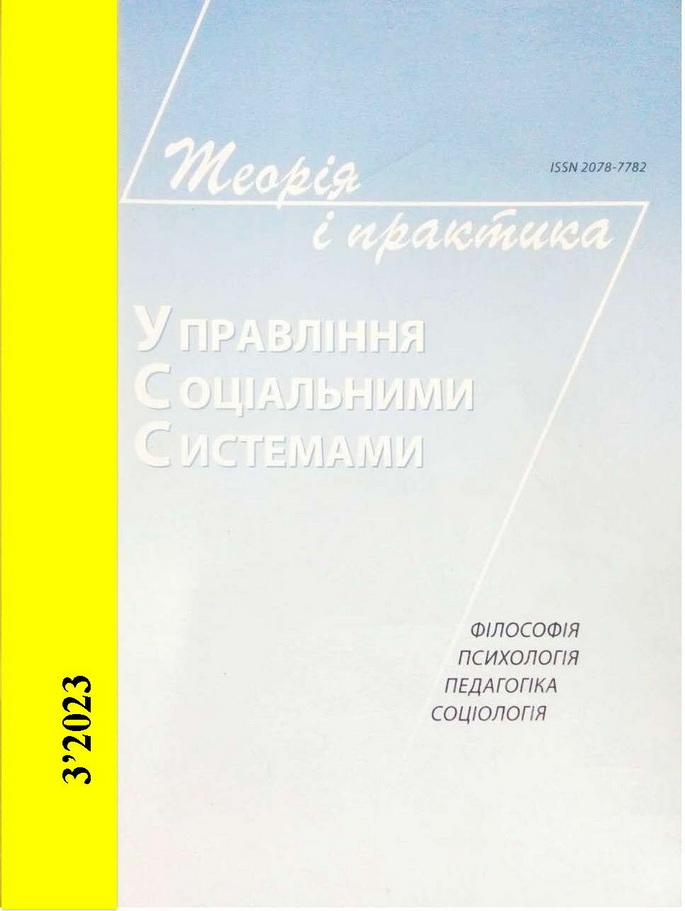СТРУКТУРНО-ФУНКЦІОНАЛЬНА МОДЕЛЬ ПІДГОТОВКИ МАЙБУТНІХ УЧИТЕЛІВ ПОЧАТКОВОЇ ШКОЛИ ДО ЗАСТОСУВАННЯ НАВЧАЛЬНО-ІГРОВИХ ТЕХНОЛОГІЙ В ОСВІТНЬОМУ ПРОЦЕСІ
DOI:
https://doi.org/10.20998/2078-7782.2023.3.02Ключові слова:
структурно-функціональна модель, процес підготовки майбутніх учителів початкової школи, навчально-ігрові технології, освітній процесАнотація
Розроблено та науково обґрунтовано структурно-функціональну модель підготовки майбутніх учителів початкової школи до застосування навчально-ігрових технологій в освітньому процесі. Охарактеризовано блоки моделі підготовки майбутніх учителів початкової школи до застосування навчально-ігрових технологій в освітньому процесі: організаційно-цільовий, змістово-функціональний, критеріально-діагностичний та результативний, яка ґрунтується на цивілізаційному, особистісно орієнтованому, діяльнісному, технологічному, синергетичному, акмеологічному, культурологічному підходах і загальнодидактичних та специфічних принципах, містить мотиваційно-цільовий, операційно-діяльнісний і корегувально-рефлексивний компоненти, які реалізуються через визначені організаційно-педагогічні умови. Встановлено, що цільовими орієнтирами упровадження розробленої моделі є не тільки опанування здобувачами освіти новими професійними знаннями, способами вдосконалення педагогічної діяльності, а й розкриття ними внутрішніх сил і резервів, творчого потенціалу, особливостей особистісно-професійного самоздійснення; усвідомлення сенсу та цінностей навчально-ігрових технологій, які є ядром професіоналізму й лежать в основі дій вчителя-професіонала.
Посилання
Lebid, I., Andryushchenko, O., Petrychenko, L., Skrypnyk, N., Vyshnivska, N., Zubtsova, Y. (2023), “The Use of Inno-vative Technologies in the Process of Form-ing the Competence of Future Elementary School Teachers as a Requirement of Post-modern Development of Society”, BRAIN, Broad Research in Artificial Intelligence and Neuroscience, Vol. 14, no. 1. pp. 285 – 301, available at: https://doi.org/10.18662/brain/14.1/420
Bida, O. (2019), “The content of the concept of «professional subjectivity of the future primary school specialist”, Scien-tific journal of the Vasyl Stefanyk Pre-Car-pathian National University, Educational space of Ukraine. Ivano-Frankivsk: Vasyl Stefanyk Pre-Carpathian National University Publishing House, vol. 17, pp 38 – 45
Koval, L. (2021), “The European vector of strategic changes in the profes¬sional training of future primary school teachers”, Pedagogy of creative personality formation in higher and secondary schools: coll. of science pr., Edited by: A. Sushchenko (chief editor) and others, Zaporizhzhia: KPU, is. 76, vol. 1, pp. 158 – 161
Komar, O. (2011), “Theoretical and methodical principles of training future primary school teachers for the use of inter-active technology”, Author’s review Dr. Ped. Sciences: 13.00.04. Cherkasy, p.40
Koroleva, L., (2019), “Conceptual principles of pedagogical influence on the process of training future primary school teachers of the New Ukrainian School for the development of creative abilities of younger schoolchildren”, Scientific journal of the Na-tional Pedagogical University named after M. Drahomanov: coll. of science pr. National Pedagogical University named after M. Dra-homanov, Series 5. Pedagogical sciences: realities and prospects, pp. 147 – 151
Marko M., (2017), “Determining the structural components of the readiness of future primary school teachers to use educa-tional and game technologies”, Scientific Journal “ScienceRise: Pedagogical Educa-tion”, vol. 7 (15), pp. 49 – 53
Prima, R. M. (2016), “ Formation of professional mobility of the future primary school teacher – demand of time”, Pedagogi-cal education: theory and practice, Psychol-ogy. Pedagogy, vol. 25, pp. 40 – 45
Savchenko, O. Ya. (2011), “Qual¬ity of primary education: essence and influ-encing factors. Scientific Bulletin of Myko-laiv State University named after V. O. Sukhomlynskyi. Series: “Pedagogical Sciences”, Issue 1.33. P. 9 – 15
Nesprava, M., Zarishniak, I., Koropetska, O., Kurinna, А., Syvash, S., Sushchenko, L. (2023), “Formation of Com-municative Competencies of Applicants for Higher Education in the Context of Distance Learning”, Revista Romaneasca Pentru Edu-catie Multidimensionala, 15(1), 247 – 260, available at: https://doi.org/10.18662/rrem/15.1/695
Horuzha, L., (2016), “In search of new pedagogy: critical analysis”, Continuous professional education: theory and practice, is. 3-4, pp. 7 – 11
Cózar-Gutiérrez, R., Sáez-López, J. (2016), “Game-based learning and gamification in initial teacher training in the social sciences: an experiment with Mine-craftEdu. Int J Educ Technol High Educ, 13, 2, available at: https://doi.org/10.1186/s41239-016-0003-4 (Last accessed: 20.01.2021)
Konopka, C., Adaime, M., Mosele, P. (2015), “Active Teaching and Learning Methodologies: Some Considera-tions”, Creative Education, no. 6, pp. 1536 – 1545
Landay, L. (2014), “Myth blocks: How LEGO transmedia configures and re-mixes mythic structures in the Ninjago and Chima themes”, In M. J. P. Wolf (Ed.), LEGO studies: Examining the building blocks of a transmedial phenomenon, New York, NY: Routledge, pp. 55 – 80
Parker, R. (2019), “Learning through play in primary school classrooms. International Developments”, Australian Council for Educational Research, June. pp. 20 – 21
Stavans, M., Diesendruc, G. (2021), “Children Hold Leaders Primarily Responsible”, Not Entitled, Child Develop-met, no. 92(1), pp. 308 – 323
Oleksiuk, V. (2011), “Features of the value-meaning sphere in the second half of childhood”, Psychology and society, vol. 3, pp. 96–103
Bugherko, М. (2011), “The reflex-ive essence of the longitudinal innova¬tion-psychological experiment on modular-developmental training”, Psychology and society, vol. 3, pp. 137 – 153
##submission.downloads##
Опубліковано
Номер
Розділ
Ліцензія
Авторське право (c) 2023 Альона Ходаковська

Ця робота ліцензується відповідно до Creative Commons Attribution-NonCommercial-NoDerivatives 4.0 International License.
Автори, які публікуються у цьому журналі, погоджуються з наступними умовами:- Автори залишають за собою право на авторство своєї роботи та передають журналу право першої публікації цієї роботи на умовах ліцензії Creative Commons Attribution License, котра дозволяє іншим особам вільно розповсюджувати опубліковану роботу з обов'язковим посиланням на авторів оригінальної роботи та першу публікацію роботи у цьому журналі.Автори, які публікуються у цьому журналі, погоджуються з наступними умовами:

